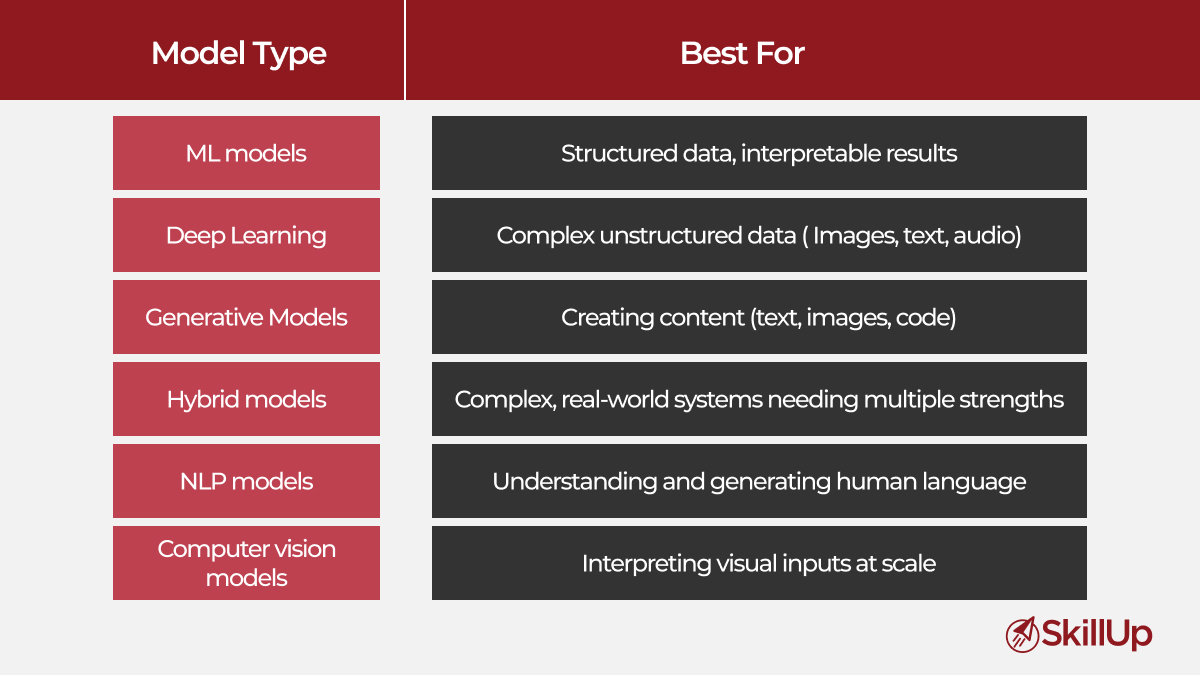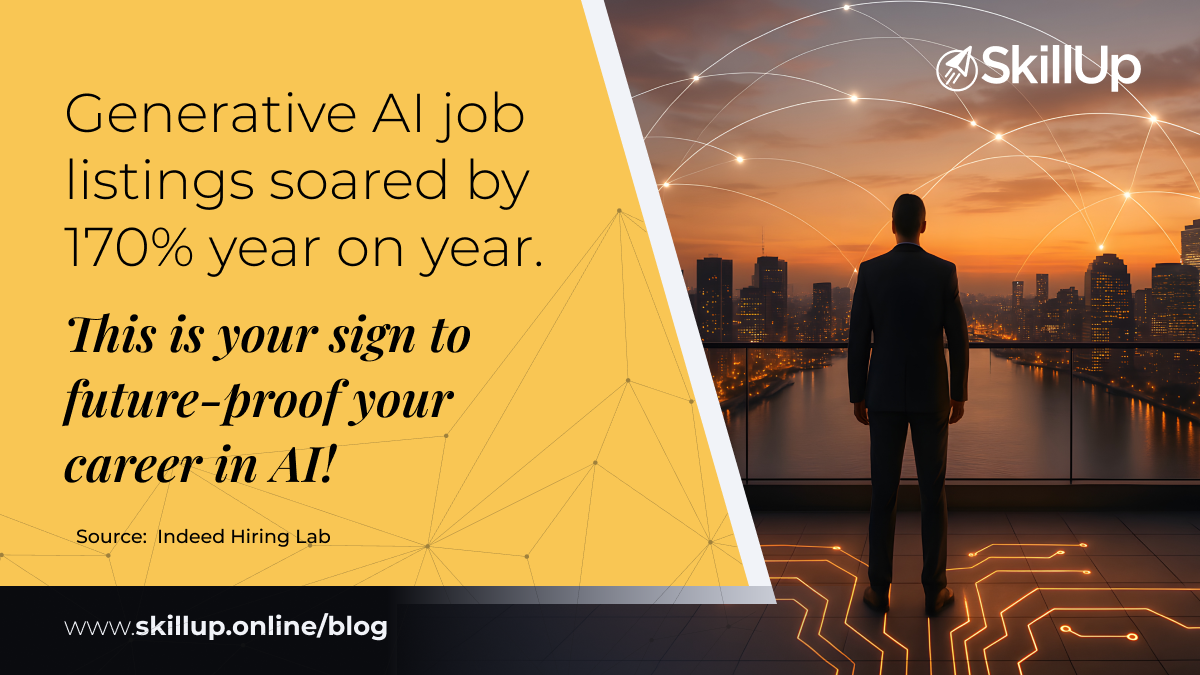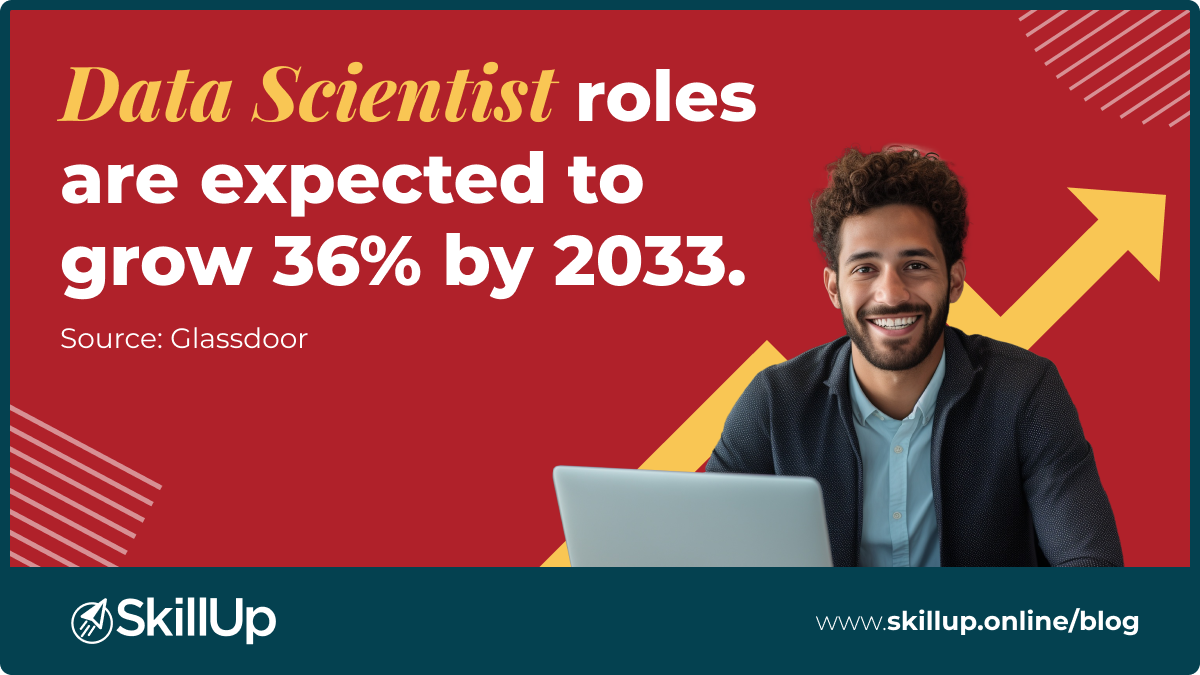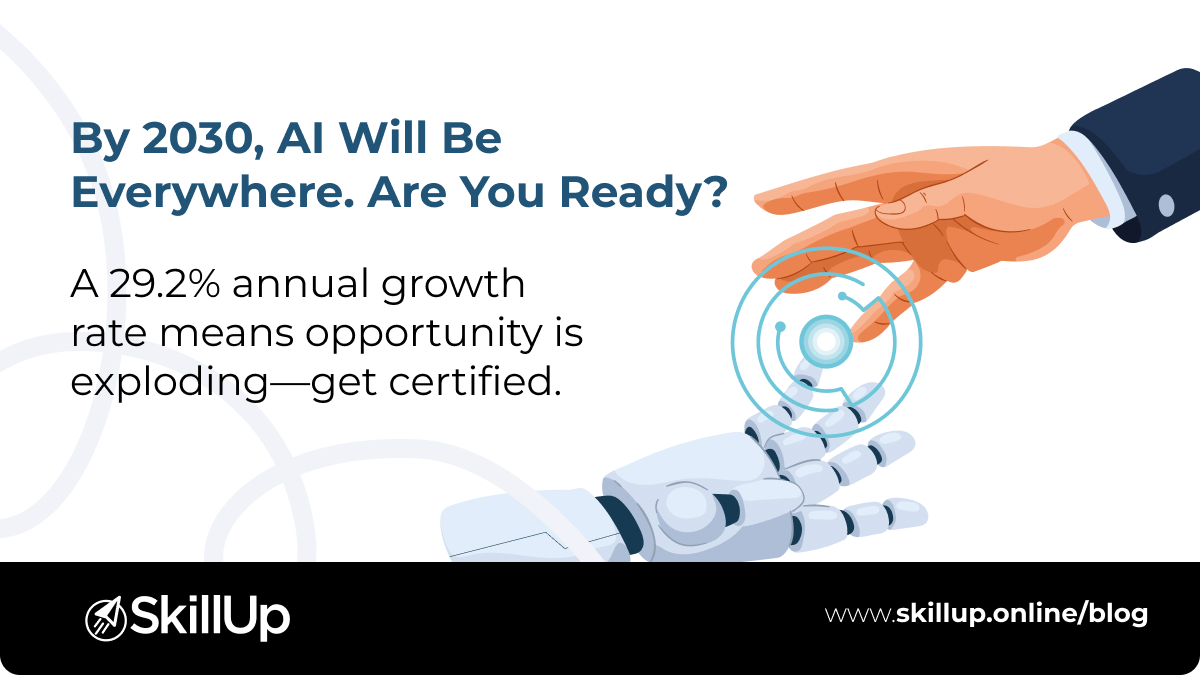If you’re asking yourself whether a career in AI or Data Science is better, you have a lot to look forward to regardless of which route you take. Both AI and data science are booming, and individuals with strong skills that apply to either are in high demand. Furthermore, the data science market is expected to reach 322.9 USD billion in 2026 (Source) and 407 USD billion by 2027 (Source)
However, if you are asking this, be reassured that you’re not alone. It may feel as though the wrong decision could be a costly mistake, but the reality is that both industries utilize similar skills, and any groundwork you carry out now will not be wasted. Where data science employs AI as a key tool in its armoury, developing an AI-related product calls for expert-level knowledge in data science, as the two work together all the time.
So, to help you decide which route to take, let’s explore this a little further.
What is data science?
 The field of data science encompasses a wide range of specializations and skills, including statistics, mathematics, computer science, and machine learning. As a discipline, it involves extracting and interpreting information from data using statistical and computational techniques and making data-driven decisions. Data scientists utilize a wide range of statistical techniques that include non-linear, linear, and logistic regression and special-purpose software. In short, it’s very mathematical.
The field of data science encompasses a wide range of specializations and skills, including statistics, mathematics, computer science, and machine learning. As a discipline, it involves extracting and interpreting information from data using statistical and computational techniques and making data-driven decisions. Data scientists utilize a wide range of statistical techniques that include non-linear, linear, and logistic regression and special-purpose software. In short, it’s very mathematical.
What is artificial intelligence (AI)?
The goal of AI is to simulate human intelligence. Its various sub-domains include decision-making, machine learning and deep learning, natural language processing (NLP), computer vision (CV), cognitive computing, and robotics. AI engineers collaborate with data scientists to find solutions to challenging business issues. They take in vast volumes of data and employ cutting-edge machine learning methods to automate manual operations and reduce errors, speed up activities, and enhance efficiency, which improves processes, customer service, and product development.
What does a data scientist do?
The job of a data scientist is to collect data and analyze it. The role also involves applying statistical techniques and predictive modeling through machine learning to derive insights.
Core responsibilities include:
- Comprehensively understanding a business problem and designing data-driven solutions.
- Collecting relevant data, which can range from small, unstructured data sets to huge, complicated data sets.
- Building data pipelines to clean, transform, and pick pertinent data points from the data and prepare it for future analysis.
- Using statistical methods to decipher the data and draw conclusions.
- Building data models using a variety of predictive methodologies, such as machine learning models, to address business issues.
- Utilizing hyperparameter fine-tuning to enhance and optimize machine learning models.
- Improving models by working with business teams, data analysts, and other stakeholders to solve business problems.
- Assisting with deploying models into production.
- Interacting with relevant stakeholders.
What does an AI engineer do?
Artificial intelligence engineers employ AI methodologies to create software and systems that can aid businesses in increasing productivity, decreasing expenses, boosting profitability, and making smarter business decisions.
Core responsibilities include:
- Identifying a business issue and creating an AI use case.
- Assessing the data needs for a use case of AI.
- Collecting information and categorizing it as necessary.
- Building a data pipeline by fusing data sources in accordance with a use case.
- Developing a comprehensive infrastructure for deploying an AI model.
- Building an application program interface (API) to give developers a scalable and flexible way to integrate AI models into applications.
- Building AI models, which can include using computer vision, deep learning techniques, natural language processing, etc.
- Training AI models and fine-tuning them in accordance with business needs.
- Creating a stable deployment environment with CI and CD pipelines.
- Examining and implementing AI models to address business issues.
- Using version control repositories to maintain code and artifacts.
Is a career in AI or data science better?
To decide which career path to take, you need to work backward.
Start by considering your interests and cross-checking them against the corresponding skill sets required under each path. This seems an obvious suggestion but remember you’re going to work in your chosen domain for a long time, so it makes sense to fill your days working with technologies that fascinate you. For instance, if data processing, data analysis, formulating predictions, and visualizing data capture your attention, then data science is likely to be the right choice for you. However, if automating processes and implementing predictive models interests you more, then you should look along an AI career track.
Have an honest discussion with yourself about your technical skills
Skills play a significant role in deciding between AI and data science. If you prefer the idea of working with programming languages such as Python and R, or getting involved in machine learning, then this is a flag that you should head toward data science. On the other hand, if working with TensorFlow, Jupyter Notebook, and AWS tools are an attractive proposition, then AI will float your boat more.
Then, think about the job roles you can look forward to
Typical job roles in AI and data science include:
Machine Learning Engineer
An ML engineer requires a strong understanding of programming languages, mathematics, analytical skills, data sets, and development tools. The skills required to do this job cross over between AI and data science.
Data Analyst
To be successful as a data analyst, you need a good understanding of statistical analysis, big data platforms like Hadoop, programming languages such as Python and R, as well as strong communication and analytical skills, and business knowledge.
Chatbot Developer
Chatbot developers design and create applications that automate communication processes. A good example is a customer service chatbot. A chatbot developer will design programs that use AI to simulate human communication to answer questions either via text or audio without a human needing to be involved.
Build core skills now and then decide
As you can see, there is a lot of cross-over in skillsets for AI and data science roles; statistics, mathematics, good communication, and programming. When you have these skills under your belt, the door is open for either a data science or an AI-focused career path. Talented individuals who are building core skills, therefore, will have opportunities to switch as they develop their competencies. And this means that building these core skills does not limit your options early on.
The great thing is you can get going through online training courses. You can either dip in with domain-specific training in AI or data science. Or, alternatively, you can throw yourself fully into the arena and start building skills that work for both domains. If the latter idea suits you, we recommend you take a look at our TechMaster Certificate Program in Data Science & Artificial Intelligence. It is a unique 11-month program that opens the door to both fields and gives you the practical experience and entry-level certifications from IBM and Microsoft employers are looking for.
If you would like to know more about how you can build skills and get started in the exciting world of AI and data science, contact our Learner Support Team at [email protected]. They will be more than happy to guide you on the next steps you can take.
SkillUp Online






